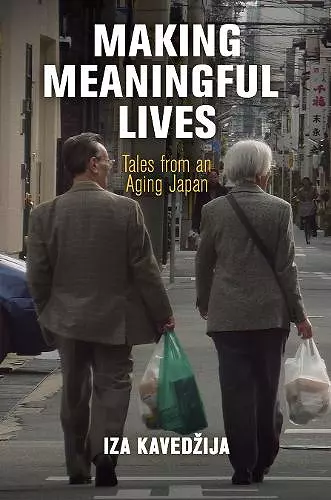Making Meaningful Lives
Tales from an Aging Japan
Format:Hardback
Publisher:University of Pennsylvania Press
Published:26th Jul '19
Currently unavailable, and unfortunately no date known when it will be back

Based on ethnographic fieldwork at two community centers in Osaka, Japan, Making Meaningful Lives provides an intimate anthropological account of the existential concerns of elderly Japanese women and men.
What makes for a meaningful life? In the Japanese context, the concept of ikigai provides a clue. Translated as "that which makes one's life worth living," ikigai has also come to mean that which gives a person happiness. In Japan, where the demographic cohort of elderly citizens is growing, and new modes of living and relationships are revising traditional multigenerational family structures, the elderly experience of ikigai is considered a public health concern. Without a relevant model for meaningful and joyful older age, the increasing older population of Japan must create new cultural forms that center the ikigai that comes from old age.
In Making Meaningful Lives, Iza Kavedžija provides a rich anthropological account of the lives and concerns of older Japanese women and men. Grounded in years of ethnographic fieldwork at two community centers in Osaka, Kavedžija offers an intimate narrative analysis of the existential concerns of her active, independent subjects. Alone and in groups, the elderly residents of these communities make sense of their lives and shifting ikigai with humor, conversation, and storytelling. They are as much providers as recipients of care, challenging common images of the elderly as frail and dependent, while illustrating a more complex argument: maintaining independence nevertheless requires cultivating multiple dependences on others. Making Meaningful Lives argues that an anthropology of the elderly is uniquely suited to examine the competing values of dependence and independence, sociality and isolation, intimacy and freedom, that people must balance throughout all of life's stages.
"Making Meaningful Lives is a carefully conducted and beautifully written ethnography about existential human questions: what is a meaningful life and how can we lead it? Iza Kavedžiji explores these questions through the narratives of elderly people living in Osaka, Japan. In so doing, she adds a fresh and new perspective to the preponderance of literature on aging (in) Japan . . . [T]he book captivates not only through its detailed insights on the life worlds of the informants but also through its optimism and its fresh and new perspective on aging and on being elderly." * Contemporary Japan *
"[A]n excellent and timely contribution to the literature on Japan’s aging society. It supplies a highly original ethnographic case study approach that allows the reader to view aging holistically from the inside out. Thanks to the quality and depth of documentation and interpretation, it also convincingly translates and interprets the aging experience...Making Meaningful Livesargues persuasively that aging requires a radical rethinking in terms of how society frames individually lived experiences and the human creation of meaning" * Japan Review *
"As people 65 and older will come to constitute 30 per cent of Japan’s population in the next few years, Iza Kavedžija’s ethnography is a highly significant book for understanding this era in the country’s history...[U]nlike most studies of elderly people in Japan, which focus on frailty and decline, Kavedžija’s skilful ethnography allows us to see her interlocutors first as human beings, continually striving for a good and enjoyable life...Kavedžija offers her readers a moving and intimate look at the lives of Japanese elders in the 2000s and 2010s." * Journal of the Royal Anthropological Institute *
"Making Meaningful Lives is engrossing, beautifully written, and well-researched. It demonstrates compellingly that a book centered on aging and older persons can illuminate much broader processes." * Sarah Lamb, Brandeis University *
ISBN: 9780812251364
Dimensions: unknown
Weight: unknown
216 pages